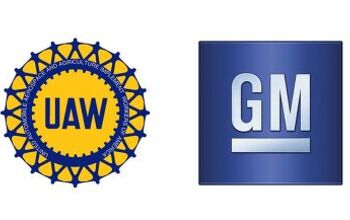Fiat Chrysler Reaches Proposed Tentative Agreement With UAW

If you’ve followed the news lately, that headline could easily include the term “scandal-plagued” twice. Fiat Chrysler, currently pursuing a merger deal with Groupe PSA while battling a racketeering lawsuit filed by General Motors, has inked a tentative four-year labor deal with the United Auto Workers — a union facing the biggest scandal in its history.
At least in this latest round of bargaining, the UAW didn’t have its former president, Gary Jones, lurking in the background under a cloud of suspicion. Jones resigned as president, and then from the union altogether, late last month after the board moved to oust him.
Thus far, FCA hasn’t said much about the proposal signed Nov. 30th, though the UAW has released snippets of its contents. GM, the first Detroit Three automaker to sit across the table with the UAW’s bargaining team, set the tone for deals to follow, providing a pathway to full-time employment for temporary workers, wage increases, jacked bonuses, and no changes to healthcare coverage. Ford followed suit last month.
While the FCA deal was expected to be a more difficult one to reach, it’s possible that the racketeering lawsuit, in which GM claims FCA bribed UAW officials to go easy on them during the last round of bargaining, coupled with the impending merger, helped the union draw concessions from its bargaining partner.
“Our UAW Bargaining Committee worked diligently, over many months, during the General Motors strike and Ford negotiations to maintain productive negotiations with FCA,” said UAW Vice President and UAW-FCA Department Director Cindy Estrada in a statement.
“The pattern bargaining strategy has been a very effective approach for the UAW and its members to negotiate economic gains around salary, benefits and job security. In addition to the $4.5 billion in major investments previously announced, negotiators secured an additional $4.5 billion for a total of $9 billion of investments adding 7,900 jobs during the contract period.”
Full details of the agreement won’t be released until the UAW-FCA National Council meets on December 4th to look over the proposed document and decide whether it’s good enough. After that, the deal goes to members for ratification. That vote would begin December 6th.
Acting UAW President Rory Gamble, who’s currently embarking on a clean-up operation aimed at avoiding federal oversight of the union (which is still a possibility, one federal prosecutor claims), hailed the tentative deal.
“FCA has been a great American success story thanks to the hard work of our members,” Gamble said. “We have achieved substantial gains and job security provisions for the fastest growing auto company in the United States.”
[Image: Fiat Chrysler Automobiles]

More by Steph Willems
Latest Car Reviews
Read moreLatest Product Reviews
Read moreRecent Comments
- Jalop1991 Our MaintenanceCosts has been a smug know-it-all.
- MaintenanceCosts If I were shopping in this segment it would be for one of two reasons, each of which would drive a specific answer.Door 1: I all of a sudden have both a megacommute and a big salary cut and need to absolutely minimize TCO. Answer: base Corolla Hybrid. (Although in this scenario the cheapest thing would probably be to keep our already-paid-for Bolt and somehow live with one car.)Door 2: I need to use my toy car to commute, because we move somewhere where I can't do it on the bike, and don't want to rely on an old BMW every morning or pay the ensuing maintenance costs™. Answer: Civic Si. (Although if this scenario really happened to me it would probably be an up-trimmed Civic Si, aka a base manual Acura Integra.)
- El scotto Mobile homes are built using a great deal of industrial grade glues. As a former trailer-lord I know they can out gas for years. Mobile homes and leased Kias/Sentras may be responsible for some of the responses in here.
- El scotto Bah to all the worrywarts. A perfect used car for a young lady living near the ocean. "Atlantic Avenue" and "twisty's" are rarely used in the same sentence. Better than the Jeep she really wants.
- 3-On-The-Tree I’ll take a naturally aspirated car because turbos are potential maintenance headaches. Expensive to fix and extra wear, heat, pressure on the engine. Currently have a 2010 Corolla and it is easy to work on, just changed the alternator an it didn’t require any special tools an lots of room.


































Comments
Join the conversation
Good that the workers are getting more but in the long run this will not last as more production is automated and more production is moved overseas. This of course will happen regardless if the workers get more. There will be more mergers and consolidations globally in the automotive sector.
Mercedes and BMW are in a whole different league than smaller compact cars and crossovers. For smaller less expensive vehicles it is still cheaper to make them in Mexico, China, Thailand, and India, Eventually the trade will be settled and the import duties will go down or in some cases eliminated. Even if vehicles are not produced overseas more automation will eliminated many of the higher paying auto jobs.